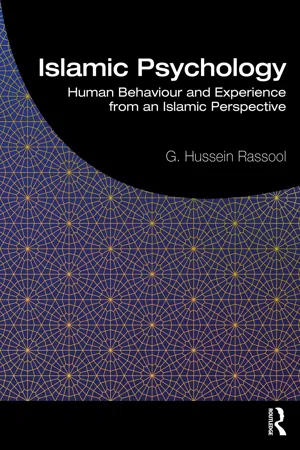
Islamic Psychology
Human Behaviour and Experience from an Islamic Perspective
- 620 pages
- English
- ePUB (mobile friendly)
- Available on iOS & Android
About this book
Islamic Psychology or ilm an-nafs (science of the soul) is an important introductory textbook drawing on the latest evidence in the sub-disciplines of psychology to provide a balanced and comprehensive view of human nature, behaviour and experience. Its foundation to develop theories about human nature is based upon the writings of the Qur'an, Sunna, Muslim scholars and contemporary research findings.
Synthesising contemporary empirical psychology and Islamic psychology, this book is holistic in both nature and process and includes the physical, psychological, social and spiritual dimensions of human behaviour and experience. Through a broad and comprehensive scope, the book addresses three main areas: Context, perspectives and the clinical applications of applied psychology from an Islamic approach.
This book is a core text on Islamic psychology for undergraduate and postgraduate students and those undertaking continuing professional development in Islamic psychology, psychotherapy and counselling. Beyond this, it is also a good supporting resource for teachers and lecturers in this field.
Frequently asked questions
- Essential is ideal for learners and professionals who enjoy exploring a wide range of subjects. Access the Essential Library with 800,000+ trusted titles and best-sellers across business, personal growth, and the humanities. Includes unlimited reading time and Standard Read Aloud voice.
- Complete: Perfect for advanced learners and researchers needing full, unrestricted access. Unlock 1.4M+ books across hundreds of subjects, including academic and specialized titles. The Complete Plan also includes advanced features like Premium Read Aloud and Research Assistant.
Please note we cannot support devices running on iOS 13 and Android 7 or earlier. Learn more about using the app.
Information
Part I
Islamic psychology
Chapter 1
Islamic psychology
Learning outcomes
- Define psychology from a secular perspective.
- Identify the contributions of the Islamisation of knowledge movement in the development of Islamic psychology.
- Identify the problems and issues associated with the secularisation of psychology.
- Discuss the relationship of the Qur’an and psychology.
- Discuss the concept of Islamic psychology.
- Formulate your own definition of Islamic psychology.
- Discuss the different approaches to Islamic psychology.
Introduction
Contemporary psychology: Definitions
Table of contents
- Cover
- Half-Title
- Endorsements
- Title
- Copyright
- Dedication
- Contents
- List of illustrations and tables
- Preface
- Acknowledgements
- PART I Islamic psychology
- PART II Biological and developmental psychology
- PART III Social and personality psychology
- PART IV Cognitive psychology
- PART V Health psychology
- PART VI General and abnormal psychology
- PART VII Postscript
- Index